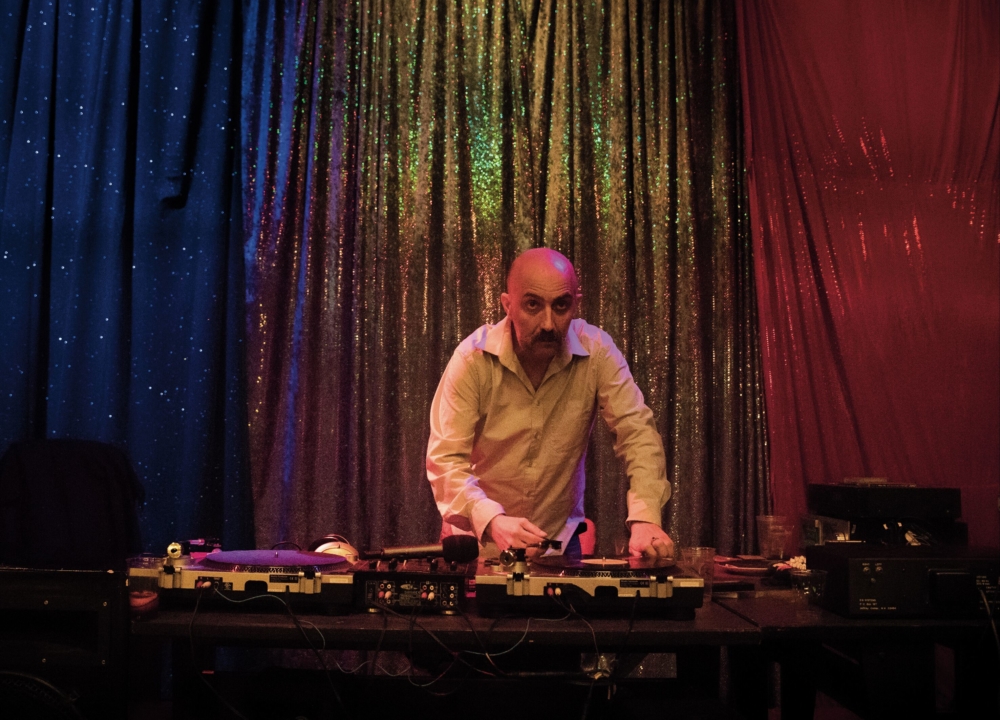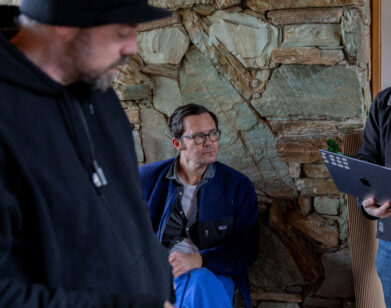Gaspar Noé Offers Us Advice on Getting High and How to Watch His Sometimes Gruesome Films

Photos by LAURENT LUFROY / FABIEN SARFATI. Courtesy of A24.
Gaspar Noé has made a cinematic legend out of visual provocations so severe that the French director’s name alone has become a metonym for a genre of film. Hyper-violence, relentlessly innovative cinematography, simple narratives, and pulsing techno music are bundled into films that operate like rambling hallucinations. Noé’s latest film, Climax, is no different. It’s a simple tale of a dance troupe celebration that descends into claustrophobic madness. (Spoiler alert: Something is in the sangria.) Attempting to section off and discern meaning in the film’s manifold themes — sex, partnership, human form, collective, psychotropic drugs — is to miss that Noé’s aim is experiential with a dash of philosophical inquiry. Take him at his word when, as the film draws to an end, the screen cuts to a single sentence revealing the film’s simple thesis: “DEATH IS AN EXTRAORDINARY EXPERIENCE.”
From his breakthrough film, 2002’s Irreversible, to 2015’s Love, there’s a question of endurance on the viewer’s behalf and of exhaustion on the critic’s behalf. After Climax’s premiere at the Cannes Film Festival, the 55-year-old director expressed a kind of trolling dismay at the fact that only six people walked out of the theater. (“I must be doing something wrong,” he told The Guardian.) Some critics have reacted to Noé’s legacy in a seemingly reactionary posture, as well. The New Yorker’s resident cineaste, Richard Brody, went with a swift thumbs down, deeming Climax “numbingly dull” with “schematic images as empty as the story.” Others, like New York’s Emily Yoshida, have noted the “joy” that floods Climax. (She also referred to Noé as a “noted dick of French Extremity.”) It begs the question of his intention to provoke, and of his irritation at being labeled a provocateur, as Noé did in conversation this past week with The Ion Pack, New York City’s still-anonymous Instagram troll of the downtown film world. While Noé’s reaction to the term feels performative at face, the French origin of the word (“provoking agent”) makes a case in his favor. That is, his films are extraordinary not for the reaction they induce, or that we assume he wants to induce, but for their ability to introduce a provoking agent and follow it to its end-point — as is the case of the actors in Climax, and likely for its viewers, in an exhausted heap on the floor. —NATHAN TAYLOR PEMBERTON
–––
THE ION PACK: A lot of people see you as a provocateur. Could you speak about the role of the provocateur or the role of somebody putting something out there that might polarize —
GASPAR NOÉ: Why, why, why do English speaking people use this French word? It seems that provocateur can only happen in France. Lars von Trier makes funny, radical movies, some packing power. But, he’s not a provocateur. He’s making adult movies for an adult audience. Pasolini, too. Fassbinder, too. You’re just portraying the cruelty of humankind, or you’re portraying the joys of sexual contact. It’s not provoking. You’re just portraying the good and bad that falls in your eyes.
ION PACK: If you read reviews—
NOÉ: Narrative cinema is just an imitation of life. Why would you prevent yourself and the audience of the same images, of the same that happened in real life? They all know that the woman that is gonna be cut in two by a magician onstage is not cut into pieces. That the rabbit that came out from the hat was already there. People that have never been to the movies or never watched TV can probably get disturbed by images. But now, with the new digital effects, you can create the goriest images in the world with no one being hurt on the set. It’s so very hard to provoke. Documentaries can provoke much more than narrative movies.
ION PACK: Do you show cuts of your films to any filmmakers or any personal friends before you’re ready?
NOÉ : I always show it to my closest friends. I like showing it to directors, mostly, because directors know what it is to edit a movie. Even if I don’t invite people, there’s always friends who know where I’m at in a movie. They say, “Oh, I was just getting a coffee around the corner, can I see some images?” So even when you don’t wanna invite people, there’s always people in the room.
ION PACK: Does that ever play a role into how a film might turn out or be edited?
NOÉ: Yeah, but you better show it to the most intelligent people, who know what editing is, and who know your taste. Most of the directors that I show my movies before the final cut, are directors that I admire, and who do movies that are very different from mine. They can clearly see where you’re heading. For example, one of my best advisers is Alain Cavalier, the French director who is 87, and whose work is really different from mine, but gives the best advice when it comes to anything of anyone I’ve ever met.
ION PACK: Do you share your films with your family?
NOÉ: Yeah. My father’s favorite movie, until now, was Enter The Void. He said, “The one I understand most is Love, but Climax is my favorite.” He’s watched it four times already. My mother is dead, but she really liked Irreversible. She also came to Cannes when we were showing Enter The Void. My mother was much more obsessed with cinema than my father.
ION PACK: You’re very funny and have a very good sense of humor, so I was curious if you had an opinion about comedy in your films.
NOÉ: Actually, it’s against my will. It’s as if I’m always trying to make a movie closer to Dreyer or to Cronenberg, but I always end up doing films like Buñuel’s, which are funny. My sense of humor gets inside the movie, even when I don’t want it. I like serious movies! For example, a movie like Amour made me cry a lot. I wish that one day I could do a movie that people would not laugh during, but for sure the funniest one I have ever done was the last one.
ION PACK: You make use of a rotating camera in Climax. There’s a very lyrical way in which the camera moves, and I was wondering if you could talk about the first time you saw the film Angst, and the effect that that had on you.
NOÉ: Friends had it on VHS in the 1980s because it had an X-rating for extreme violence. There were no other moves given an X-rating for violence, alone. If it ever had a theatrical release, it would have been in porn theaters. A friend told me, back then: “I have this movie. It’s the sickest movie ever.” It’s true that there is something sickening in a very particular kind of way in that movie because of its psychotic use of the camera. Also because of the relentless voice-over that puts you in the head of someone who is schizophrenic. It’s really mind-blowing. I watched that movie 50 times in a row. Each time I had a friend over at my house, we played for them. You can tell that I was inspired by Angst when I did Seul Contre Tous because there’s a relentless voice over, and in Climax, because there are camera movements that you can relate to Angst.
ION PACK: Your movies really capture the chaos of the rave experience. What are your experiences with raves and French techno?
NOÉ: I like partying. I like dancing, but I never go dance. Only once or twice in my whole life have I gone to a rave. I’m more likely to be found dancing in apartment parties or nightclubs. I know so many french DJs, musicians. There’s a big techno scene in France. The most famous ones of course are Daft Punk. It’s my favorite music for dancing.
When I was writing the script for Enter The Void, I discovered the French techno scene. And doing Seul Contre Tous and Irreversible, I discovered Tokyo’s techno scene — and the pills. You can feel it when you see Enter The Void.
ION PACK: What are your thoughts about using drugs on set — or anything that will change your mindset in a professional setting? What energy do you think that might bring to your work?
NOÉ: When I shoot a movie, when people go out to party in France, in London, New York or anywhere, there’s always some friends who have drugs and propose it. I like the happy ones, I don’t like the speedy ones. My favorite one is simply alcohol — as long as you don’t get too drunk, and you don’t blackout or forget anything.
When you’re on a set, though, I wouldn’t recommend any directors using drugs because you have to be extremely aware of what’s going on. If you take an upper, you come down, and then you’re a mess. On the set, the best thing is to be on vitamins, eating good food — sometimes have a drink and smoke a cigarette. You have to be very aware of every single member of your crew, who is in front or behind the camera. It’s very diplomatic work. You must be linked to every person.
ION PACK: When you do a film, do you get a lot of sleep?
NOÉ: Even when you finish early and you can sleep for seven hours, the truth is you start watching your scenes, and you’re sitting and taking notes until three or four in the morning. During Enter The Void, I was sleeping four hours a night, at most, because I’m so busy thinking about the following day.
ION PACK: I read a story that Irreversible’s creation was happenstance, that you had to do it all at once because you had just found financing for a different script and that the actors [Vincent Cassel and Monica Bellucci] weren’t actually comfortable making that film.
NOÉ: I wrote the script for Love, which was called “Danger” at the time, and proposed it to Vincent and Monica, who I knew. They said yes. I wrote the movie in a month and half, but when they read the script they were worried there was too much nudity. So I said: “Fine, if you’re free, let’s try to make another movie.” The producers were ready to finance Love with them, but I proposed something else. I said, “Let’s do a rape and revenge movie told backwards, instead.” They agreed. So, we started preparing the movie. We didn’t have a title. We didn’t have a script, but six weeks later we were shooting the movie. We shot it in chronological order. The way I conceived and shot that movie inspired how Climax was made. There was a very fast pre-production and a very fast post-production.
ION PACK: Do you prefer working in chaotic situations?
NOÉ: Not necessarily, but I don’t like forcing actors or an actress to learn lines that I wrote. I think the way they talk is always richer than my lines. Of my films, the less-scripted ones are the only commercial successes. Irreversible was a big commercial success. Now, Climax is doing very well. All the movies that I wrote and prepared for weren’t commercial successes.
ION PACK: Do you see a correlation between those two?
NOÉ : I think that when you do something out of chaos, it’s fresher. When you over-script something, if you struggle over something or you over-prepare something, it loses its freshness. Movies are about energy, they’re not about scripts. You can start with the energy on the set.
ION PACK: The energy of youth is also deeply evident in Climax. How was it to work with non-actors, with the young people of Paris?
NOÉ: I wanted the movie to have the most hypnotic dancers that I could find around Paris. I cast them for their charisma, and their dancing skills. Some of them were kind of, “Do we have to learn lines, or are we gonna act?” I said, “Of course, we’re gonna act, but the other way around.” The movie would’ve been a total failure if they couldn’t dance. It’s easier to bring a good dancer to act than to bring a good actor to dance.
ION PACK: Do you have much hope for this new generation of filmmakers? It’s probably a question you’ve answered before, but what would you say to younger filmmakers or younger artists and what you hope to see from them because I think that you bring something fresh, regardless of what’s going on. And I think a lot of people don’t do that.
NOÉ: I would say follow your idols. If you’re impressed by Deliverance, try to do a movie like Deliverance one day. Consider all your idols from the present or from the past, and try to top them, or try to do as well as them, at least. For me, watching Fassbinder or Pasolini is inspiring. I think, “How could this guy do this movie 30, 40, 50, 60 years ago?” That gives you hope, and then you stop listening to all the people who bring their own good ideas which are mostly very bad.
ION PACK: What would you tell somebody who has never seen any of your films before?
NOE: Enjoy them. When people go to see movies, they know that it’s just an imitation of life, that it’s not documentary. And in the case of Climax, I would tell them to bring their younger brothers, or sisters, or their kids, so they know what alcohol is about.






